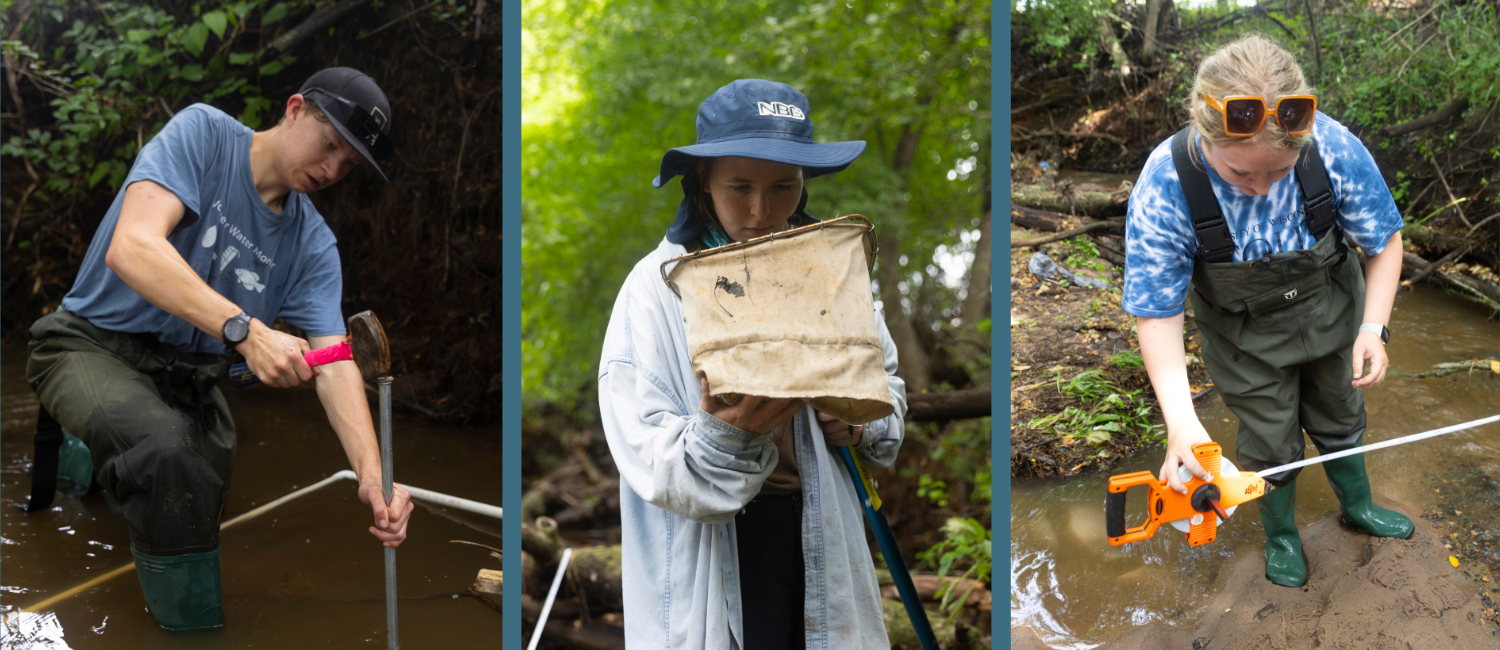
Six students from UW-Eau Claire, UW-River Falls, and UW-Stout spent the summer collecting and analyzing data that helps show the impact of restoration efforts in the Red Cedar Basin. This watershed includes Lakes Menomin and Tainter, which are listed as impaired by the Wisconsin Department of Natural Resources. Nutrient pollution causes frequent harmful algal blooms in these water bodies and others throughout Wisconsin. The data students gather each summer is used to support management decisions.
Cayanna Erickson says interning with the 2025 Red Cedar Basin Monitoring Group will give her a step up when she enters the job market. The UW-Stout undergraduate recently declared an Environmental Science major, and the summer internship gave her experience with hands-on field work.
“My career goals involve water monitoring, specifically in the Eau Claire area as that is where I am from originally,” she says. “The skills that I learned this summer directly relate to what I want to do in the future.”
Hands-on Experience for Future Water Professionals

Erickson was one of six students from UW-Eau Claire, UW-River Falls and UW-Stout who spent the summer collecting and analyzing data that helps show the impact of restoration efforts in the Red Cedar Basin. This watershed includes Lakes Menomin and Tainter, which are listed as impaired by the Wisconsin Department of Natural Resources. Nutrient pollution causes frequent harmful algal blooms in these water bodies and others throughout Wisconsin.
Despite the multitude of problems facing the Red Cedar Basin, the lakes and rivers are heavily used for angling, recreation, and power generation. This has led to multiple restoration projects to improve the health of the watershed.
The initial monitoring group was started two decades ago as a volunteer organization but languished after its leader retired. Funding from the Freshwater Collaborative since 2022 has provided continuity of data collection and built capacity to gather data from more sites and more diverse ecosystem types. Eighteen students have participated so far, and recent funding investments will ensure the project continues.
Fulfilling a Community Need
“The Red Cedar River Basin Monitoring Group trains students to collect data on aquatic ecosystems and fills a critical need of collecting data related to management and restoration,” says Nicole Hayes, an assistant professor at UW-Stout.
Hayes says the goals of the Red Cedar River Basin Monitoring Group are twofold. First, it leverages the expertise of scientists at UW-Stout to work with local community groups to understand how environmental change is impacting lakes, rivers, streams, and wetlands in the watershed. Second, it builds a better understanding of how these ecosystems are responding to ongoing degradation and mitigation and restoration efforts. The data gathered is used to support management decisions.
The group of four faculty at UW-Stout collaborates with the WDNR Fisheries, City of Menomonie, Dunn County, Beaver Creek Reserve, the Colfax Red Cedar Preserve and The Prairie Enthusiasts, among others. This allows students to start building a professional network while gaining professional skills.
Each intern also develops an independent research project in addition to contributing to the overall data collection. Several students have continued their research projects into the following academic year, and many have presented their findings at local, state and even a national conference.
Connections Beyond One Campus
Thanks to Freshwater Collaborative funding, fourteen of the interns have received scholarships to participate in additional freshwater coursework at UW-Stout, UW-Eau Claire, and UW-River Falls. The coursework helps prepare them for their internships and provides the opportunity to work with faculty and students from other universities.

“It was eye opening to see how the different universities teach as well as what areas they focus on,” says Faith Fogarty, an undergraduate at UW-Eau Claire. “The summer freshwater course was also a great way for us interns to get to know each other and get on the same page before starting our summer work.”
Grant Abelson, an undergraduate at UW-River Falls, says the individual research project helped improve his research and analysis skills. He looks forward to presenting his research at Research in the Rotunda in 2026.
“This internship allowed me to be the head of my own project and to explore my own interests more deeply,” he says.
He also found it valuable to work with students from other universities.
“It gave me a chance to gain more valuable connections and see the differences between schooling programs,” he adds. “Overall, it widened my perspective of how beneficial UW schools are.”
Read more about the students in Student Q&A: Red Cedar Basin Monitoring Group.
Written by Freshwater Collaborative of Wisconsin
Link to original story: https://freshwater.wisconsin.edu/red-cedar-basin-2025/
